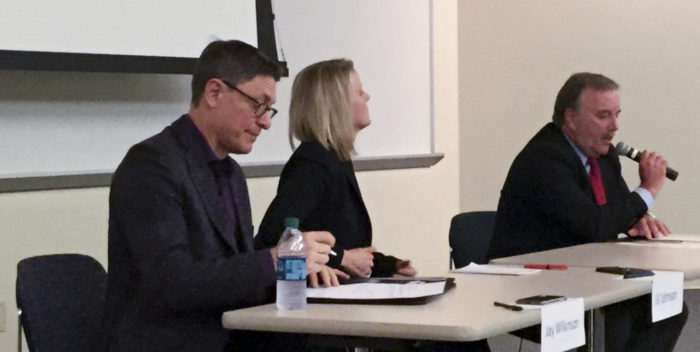Business Club Hosts Faith-Based Ethics Panel
Memorial Healthcare CEO Roger Reamer advises students on how to share the Christian faith in a secular workplace.
by Victoria Cameron
Concordia’s Business Club recently hosted an ethics panel with Firespring CEO Jay Wilkinson, Seward Public Schools Assistant Principal Jill Johnson, and Memorial Healthcare CEO Roger Reamer. Panelists shared not only discussed ethics but also gave students career advice and shared how their faith affects their professional lives.
After being introduced, Wilkinson began the panel by talking about how he creates ethical climates. In high school, he created tables in the cafeteria where “all (were) welcome” to promote a more positive environment, and he carried this attitude with him as he founded Firespring, a company in Lincoln that specializes in printing, marketing and software services.
Firespring has been called one of the top 50 places to work in America, but Wilkinson said he believes in constantly improving and pushing other businesses to improve as well. He explained that he wants his company to have a few strong values that employees can understand how to implement.
The company holds a daily meeting (accessible by slide) at which employees recognize each other for living out Firespring’s values. At the end of the work year, they make a book compiling these stories and add three people to their values hall of fame. This way, they can train new members in their values simply by asking them to read the book so new employees can learn from real people’s experiences.
Wilkinson’s other efforts to create an ethical culture in his workplace include giving every employee one paid day off each month to do volunteer work of his or her choice. He believes every company should provide similar opportunities to their employees and create a positive working environment.
“People don’t go to work every day to leave at the end of the day with the life sucked out of them. They go to work every day with the hope that they’re going to have life and energy injected into them by the time they come home from work, and we all have the ability to affect that,” Wilkinson said.
Johnson turned the topic from business to education. She asked the crowd what qualities good teachers have, and after several answers, pointed out that no one said “ethical.”. Johnson said that her job as an administrator is drawing the line and making sure teachers do act ethically.
“I probably wouldn’t have a job if everyone acted in an ethical manner,” Johnson said.
Johnson said that one exercise the teachers go through is explaining how they would respond to potential scenarios and that whether they decide to be respectful, give as good as they get, or turn over the problem to someone else says a lot about how their thought processes work and how ethical they are.
Johnson said that educators are always representing the school, even when off the clock. It is necessary that they don’t act in ways, in public or on social media, which could be perceived negatively.
Johnson closed her talk by speaking about the gray areas of ethics. She said that nobody decides suddenly that they’re going to stop being ethical.
“I don’t think it’s a matter of crossing the line, I think it’s a matter of moving the line, slowly moving the line, and justifying it to yourself,” Johnson said.
Reamer spoke about ethics in healthcare. He, like the other speakers, has a small phrase he has used in the workplace: “Be nice, it matters.” He put signs with the phrase on it throughout the building with no explanation. Nobody questioned where they came from. Employees said that it had seemed too simple to question.
Healthcare is famous for the instruction “do no harm,” but Reamer goes further by adding the goals of making things better, respecting others, being fair, and caring. These ethics are for everyone to follow, not just him.
“CEO doesn’t stand for Chief Ethics Officer. Ethics is managed and delivered by everybody in the organization,” Reamer said.
Students asked the panel questions about negativity in the workplace, ethical marketing, how to present ethics to a non-Christian company, how to balance real vulnerability with the need to represent the company, life advice, and how to be a servant leader.
Wilkinson said that he helped eliminate negativity in his workplace by having an issues board. Every employee is expected to put any issues they may have on it. This way, instead of complaining, employees have an appropriate venue for bringing forth their problems. It shows them that they are being heard, and don’t need to feel resentful.
Johnson said that she does not stop being a Christian when she goes to work, so she always carries her Christian values and ethics with her. When she feels she needs to say something based on her Christianity, she is transparent with the fact that it is because she is Christian. This gives her a foundation for being able to talk about ethics based off her faith without interfering with the school’s strong distinction between church and state.
Reamer added that while Christian faith is behind many of his actions, and those of his employees, his organization cannot specifically promote Christianity. However, though the employees come from diverse backgrounds, the focus is always on the patient’s needs, so they can all share the same values.
The panelists also talked about how to take chances in life. Johnson encouraged students to apply for jobs they may not be qualified for, as most training can only occur on the job anyway. She highlighted the necessity of being willing to be vulnerable and fail.
Wilkinson encouraged students to worry more about pushing themselves to keep growing rather than the future.
“The highest paying jobs ten years from now don’t even exist today,” Wilkinson said.
Reamer agreed.
“Don’t be freaked out if it’s not totally what you think you’re going to do for the rest of your life, because most likely your first job is not what you’re going to do for the rest of your life,” Reamer said. “Sharpen your skills, prove yourself, have good relations with people, develop integrity in what you do every day, and that’s going to carry you.”














